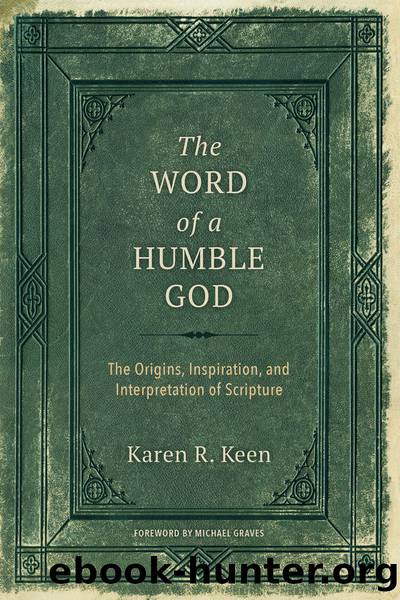The Word of a Humble God by Karen R. Keen

Author:Karen R. Keen
Language: eng
Format: epub
Publisher: Wm. B. Eerdmans Publishing Co.
Published: 2022-08-15T00:00:00+00:00
Early Rabbinic Literal Interpretation of Child Killing in the Bible
Early rabbinic commentary on child killing in the Bible is sparse and varies in its conclusions on the morality of it. But Sifre Deuteronomy (c. 300 CE),29 a midrash on the biblical book of the same name, provides an example of literal interpretation that differs from Calvin on child killing.30 Sifre Deuteronomy (Piska 92â96) discusses the implied killing of children at the apostate city, a theoretical Israelite city where Godâs people are seduced into idolatry, incurring punishment as a result (Deut 13:12â17). The Scripture passage reads:
If you hear it said about one of the towns that the LORD your God is giving you to live in, that scoundrels from among you have gone out and led the inhabitants of [their] town astray, saying, âLet us go and worship other gods,â whom you have not known, then you shall inquire and make a thorough investigation. If the charge is established that such an abhorrent thing has been done among you, you shall put the inhabitants of that town to the sword, utterly destroying it and everything in itâeven putting its livestock to the sword. All of its spoil you shall gather into its public square; then burn the town and all its spoil with fire, as a whole burnt offering to the LORD your God. It shall remain a perpetual ruin, never to be rebuilt. Do not let anything devoted to destruction stick to your hand, so that the LORD may turn from his fierce anger and show you compassion, and in his compassion multiply you, as he swore to your ancestors.
This story parallels the narrative of Jericho in Joshua 6. Both cities are devoted to destruction (herem); thus, every man, woman, and child is to be killed by the sword (Josh 6:21; Deut 13:15). Animals are also to be destroyed (Josh 6:21; Deut 13:15). All plunder and the entire city are to be burned (one exception was made for Jerichoâprecious metals were given to the Lordâs treasury; Josh 6:24; Deut 13:16). The city was never to be rebuilt again (Josh 6:26; Deut 13:16). The early rabbis recognized the similarities between these two cities and used the Jericho narrative as an intertextual lens through which to interpret the apostate city.
What is striking about Sifre Deuteronomy is how literal interpretation leads to numerous qualifiers on full implementation of the punishment. The rabbinical author notices the phrase âIf you hearâ (Deut 13:12) and concludes that authorities do not need to go looking for violations. They only need to respond if they happen to hear about the apostasy (Piska 92). In Hebrew, the word translated âscoundrelsâ by the NRSV is a masculine noun (Deut 13:13), so the rabbi concludes that the destruction of the city can only occur if the scoundrels who entice others to idolatry are men. If women were to lead the city into apostasy the command to kill all the inhabitants would not apply (Piska 93). This is not because they believe women are incapable of enticing others but because the noun is masculine.
Download
This site does not store any files on its server. We only index and link to content provided by other sites. Please contact the content providers to delete copyright contents if any and email us, we'll remove relevant links or contents immediately.
The Five People You Meet in Heaven by Mitch Albom(3569)
The Secret Power of Speaking God's Word by Joyce Meyer(3220)
Real Sex by Lauren F. Winner(3023)
Name Book, The: Over 10,000 Names--Their Meanings, Origins, and Spiritual Significance by Astoria Dorothy(2987)
The Holy Spirit by Billy Graham(2952)
0041152001443424520 .pdf by Unknown(2846)
How The Mind Works by Steven Pinker(2816)
ESV Study Bible by Crossway(2778)
Ancient Worlds by Michael Scott(2688)
Churchill by Paul Johnson(2587)
The Meaning of the Library by unknow(2572)
The ESV Study Bible by Crossway Bibles(2551)
The Gnostic Gospels by Pagels Elaine(2531)
MOSES THE EGYPTIAN by Jan Assmann(2417)
Jesus by Paul Johnson(2362)
City of Stairs by Robert Jackson Bennett(2354)
The Complete Dead Sea Scrolls in English (7th Edition) (Penguin Classics) by Geza Vermes(2283)
The Nativity by Geza Vermes(2230)
Ancient Near Eastern Thought and the Old Testament by John H. Walton(2226)
